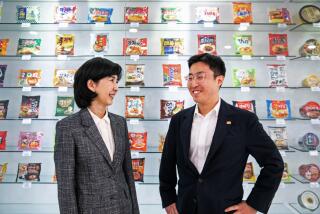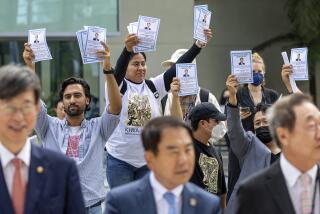Seoul Is Unable to Rein In Big Conglomerates : Economy: Planners want <i> chaebols </i> to stop expanding into new fields so that credit and other resources are used better.
- Share via
SEOUL — Would you buy a computer from a soap manufacturer?
That bizarre question is preoccupying South Korean economic planners fretting over the chaebol, the powerful family-run conglomerates that dominate the economy.
“Large has always equaled good in South Korea, but the chaebol are spread too thin,” said economist Yun Yuo-jin.
Critics say chaebol --engaged in everything from oil to high fashion, cars to sugar, computer chips to detergent--are big, complacent fish in too small a pond. They squander resources by competing ruthlessly against each other at home instead of in the international marketplace, the argument goes.
Worse, the sheer size, weight and political influence of giants such as Samsung, Hyundai, Lucky-Goldstar and Hanjin smother smaller, entrepreneurial manufacturers, critics add.
Planners want to slow or even halt the conglomerates’ headlong expansion into diverse new fields and encourage them to become more focused and competitive. But they face an uphill task.
The conglomerates’ political power may have waned since the heady days of the 1960s and 1970s. But with the exception of the Hyundai Group, government links with the companies are still strong.
Hyundai founder Chung Ju-yung abandoned business for politics this year, running on an anti-government ticket.
The combined turnover of the top 10 chaebol equaled 77.3% of South Korea’s gross national product in 1990 and the top 50 accounted for 97.4%, according to the British merchant bank S. G. Warburg.
All that economic muscle is concentrated in few hands.
“Founding family members currently hold more than 75% of all chief executive and managing director positions in chaebol- affiliated companies,” the Warburg report said.
Attempts to curb the chaebols’ propensity to gobble up scarce credit at the expense of smaller independents have fallen flat, government figures show.
Exasperated bankers complain of a serious strain on the creaky and antiquated banking system.
“On the last day of every month, we have to fiddle the figures to keep the ratios steady,” said a European banker.
“If a few non- chaebol companies repay a loan, we have to theoretically get a similar proportion of chaebol loans repaid. In the event there’s a lot of artificial rollovers, no money actually flows.”
Worse, much of the paper shuffling counts for nothing.
Bank borrowings by affiliates of the 30 largest chaebol rose 22.6% last year to $33.7 billion, official figures show.
A spokesman for the Office of Bank Supervision said the proportion of loans extended to chaebol had declined only a fraction to 18.9% of all bank commercial-sector lending, against 19% at the end of 1990.
Economists, bankers and brokers say the chaebol are simply too powerful to bring to heel overnight.
Last June, the country’s 30 largest businesses were told to nominate three core industries apiece that would spearhead South Korea’s march from a low-wage, low-quality producer to an advanced industrial nation.
The planners dangled a carrot. The three areas would be granted exceptions from government-imposed credit controls on the chaebol, which were originally imposed to prevent them from soaking up available funds at the expense of smaller producers.
Credit controls are a powerful tool in an economy where money is both tight and expensive. The benchmark three-month corporate bond currently yields around 17.8%.
The plan, however, has been judged a failure.
Twelve of the top 30 chaebol nominated petrochemicals, a choice more likely to intensify than blunt wasteful inter-company competition.
Hyundai, the nation’s largest shipbuilder, car maker and construction company, raised eyebrows when it chose petrochemicals, a new industry for the group.
“Hyundai took advantage of the scheme to expand further,” a banker said. “The plan may have been good in theory but in practice simply provided a loophole through which the chaebol could get their hands on more credit.”
Brokers said the three core companies became conduits for passing credit through to cash-starved chaebol branches.
More to Read
Inside the business of entertainment
The Wide Shot brings you news, analysis and insights on everything from streaming wars to production — and what it all means for the future.
You may occasionally receive promotional content from the Los Angeles Times.










